Expedite your nonfiction book discovery process with Readara interviews, summaries and recommendations, Broaden your knowledge and gain insights from leading experts and scholars
In-depth, hour-long interviews with notable nonfiction authors, Gain new perspectives and ideas from the writer’s expertise and research, Valuable resource for readers and researchers
Optimize your book discovery process, Four-to eight-page summaries prepared by subject matter experts, Quickly review the book’s central messages and range of content
Books are handpicked covering a wide range of important categories and topics, Selected authors are subject experts, field professionals, or distinguished academics
Our editorial team includes books offering insights, unique views and researched-narratives in categories, Trade shows and book fairs, Book signings and in person author talks,Webinars and online events
Connect with editors and designers,Discover PR & marketing services providers, Source printers and related service providers

Bernoulli's Fallacy: Statistical Illogic and the Crisis of Modern Science
Mathematics > History & Philosophy
- Columbia University Press
- Hardcover
- 9780231199940
- -
- -
- Mathematics > History & Philosophy
- (Single Author) Asian American
- English
Readara.com
Book Description
Aubrey Clayton traces the history of how statistics went astray, beginning with the groundbreaking work of the seventeenth-century mathematician Jacob Bernoulli and winding through gambling, astronomy, and genetics. He recounts the feuds among rival schools of statistics, exploring the surprisingly human problems that gave rise to the discipline and the all-too-human shortcomings that derailed it. Clayton highlights how influential nineteenth- and twentieth-century figures developed a statistical methodology they claimed was purely objective in order to silence critics of their political agendas, including eugenics.
Clayton provides a clear account of the mathematics and logic of probability, conveying complex concepts accessibly for readers interested in the statistical methods that frame our understanding of the world. He contends that we need to take a Bayesian approach--incorporating prior knowledge when reasoning with incomplete information--in order to resolve the crisis. Ranging across math, philosophy, and culture, Bernoulli's Fallacy explains why something has gone wrong with how we use data--and how to fix it.
Author Bio
Aubrey teaches graduate courses in the philosophy of probability and has written for publications like the Boston Globe, Nautilus, and Pacific Standard. He technically “worked on Wall Street” but only in the same sense that a hot dog vendor does. He is a parent, a spouse, and a resident of the City of Boston with an Erd?s number of three.
He dropped out of high school in Dallas to study math and statistics at The University of Chicago, later receiving a doctorate in mathematics from UC Berkeley in 2008.
Source: aubreyclayton.com
Videos


Community reviews
No Community reviews

